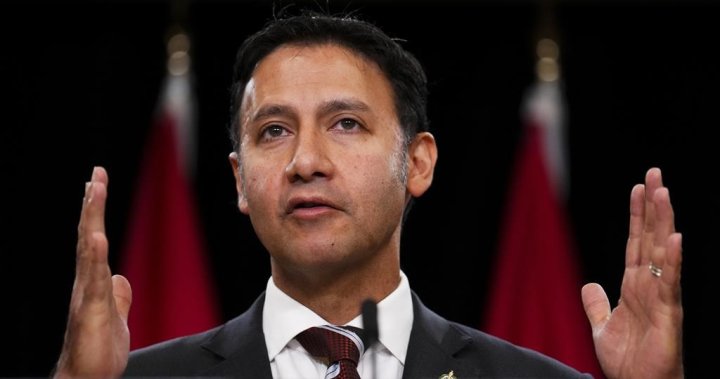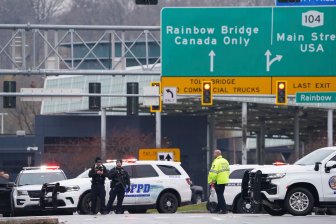Canada’s justice minister is considering options raised by the independent adviser on unmarked graves, who says Indigenous leaders want Canada to move on criminalizing residential school denialism.
Kimberly Murray called on lawmakers to consider “legal mechanisms” that could address the practice of denying or minimizing the abuses Indigenous children suffered at residential schools in her interim report released back in June.
One way to do that is by amending the Criminal Code to criminalize such actions, Murray said in a recent interview, noting Ottawa did so last year on the issue of Holocaust denialism.
“We could do the same for Indigenous people,” she said. “Make it an offence to incite hate and promote hate against Indigenous people by … denying that residential (schools) happened or downplaying what happened in the institutions.”
“Everybody in leadership when I speak about this, Indigenous leadership, … all want that amendment to happen in the Criminal Code.”
More than 150,000 First Nations, Métis and Inuit children were placed into the government-funded church-run residential school system, which was largely overseen by the Catholic Church.
The Truth and Reconciliation Commission of Canada, which spent six years investigating the system, heard from thousands of survivors who experienced physical, emotional, sexual and spiritual abuse, as well as neglect and malnutrition.
An estimated 6,000 Indigenous children died at these institutions, while many experts believe the number to be higher. The National Centre for Truth and Reconciliation has recorded the names of more than 4,000 who died.
Despite this evidence, Murray highlighted in her June report what she says is a concerning rise in denialism tied to what survivors and communities say about children who went missing or died at these institutions and are possibly buried in unmarked graves.
Attention to the deaths and disappearances of these children increased greatly when, in May 2021, the Tk’emlúps te Secwépemc Nation announced that ground-penetrating radar had located what are believed to be the unmarked graves of more than 200 children at the site of the former residential school in Kamloops, B.C.
Since then, dozens more First Nations across Western Canada and parts of Ontario have begun their own searches.
Federal ministers have acknowledged that work could take years and has pledged millions to assist communities.
Murray — who she says is herself a target of denialism — reported back in June that each time an announcement of a discovery is made, the community that shares the news is inundated with calls, emails, social media posts and in-person confrontations.
The former executive director of the Truth and Reconciliation Commission and member of the Kahnesatake Mohawk Nation in Quebec was appointed in June 2022 to take on a two-year mandate as an independent adviser to the federal government.
She’s been tasked with recommending how Ottawa could better help communities and protect possible burial sites, and her final report is due next year.
Since Murray’s appointment, Arif Virani replaced Montreal MP David Lametti as Canada’s justice minister.
When Murray released her interim report, which contained nearly 50 findings including the call for legal tools to tackle residential school denialism, Lametti expressed an openness to doing so, including the possibility of “outlawing” such talk.
When asked whether Virani is open to the same, a spokeswoman in his office said the minister “is considering the options raised in Ms. Murray’s interim report and looks forward to receiving her recommendation in the final report.”
“We must not ignore the lasting impact these schools had on Indigenous peoples — an intergenerational trauma that continues to be felt today. The denial of the atrocities that took place is painful for survivors, their families and communities,” Chantelle Aubertin said in a statement last Friday.
“Ms. Murray’s final recommendations will be critical for putting in place a federal legal framework that will preserve and protect rights and respect the dignity of the children buried in unmarked graves and burial sites connected to residential schools,” she added.
In the meantime, Murray says she hopes to see NDP MP Leah Gazan bring forward her private member’s bill seeking to criminalize such denialism, as the Parliamentarian has indicated that she will.
Asked recently about its status, the Winnipeg representative said “there is something in the works.” She later confirmed she remains committed to bringing it forward, but the timing remains unclear.
“I’m really hopeful that she will and would support her in that, and survivors want to support her in that,” said Murray.
“We’re sort of holding our breath, waiting hoping that she’ll do it in November.”
Last year, Gazan brought forward a motion to the House of Commons that called on Parliament to recognize the residential school system as genocide, which it did.
Conservative Leader Pierre Poilievre’s spokesman Sebastian Skamski has not yet responded to a request about whether the Tories would support a push to criminalize residential school denialism.
© 2023 The Canadian Press




